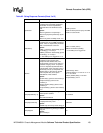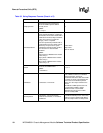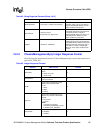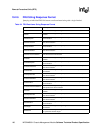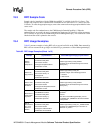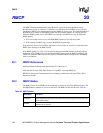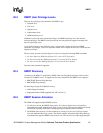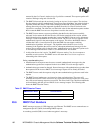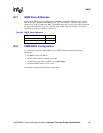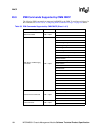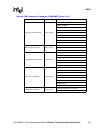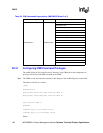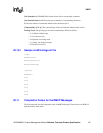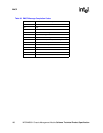
MPCMM0001 Chassis Management Module Software Technical Product Specification 191
RMCP
20.3 RMCP User Privilege Levels
There are five privilege levels defined in the IPMI1.5 spec.
1. Callback level
2. User level
3. Operator level
4. Administrator level
5. OEM Proprietary level
Callback Level has the most restricted privileges, and OEM Proprietary Level has the least
restricted privilege. The RMCP server provides the user and password support associated with
these five privilege levels.
A user level requestor is not allowed to issue a request with a higher privilege level IPMI
command. For example, a user level requestor cannot issue a request such as Clear SEL that needs
Operator privileges.
The user name, password, and privilege level can be set using the following IPMI commands:
• Set User Name (See IPMI specification V1.5 section 18.25 for details)
• Set User Password (See IPMI specification V1.5 section 18.27 for details)
• Set User Access (See IPMI specification V1.5 section 18.23 for details)
Currently only user root is supported.
20.4 RMCP Discovery
According to the IPMI 1.5 specification, RMCP client uses Ping/Pong messages to discover the
existence of an RMCP server. To support the discovery mechanism, the RMCP server supports:
• RMCP/ASF Presence Ping Message
• RMCP/ASF Pong message
For the Pong message, the CMM will convey:
• IANA Enterprise number.
• Supported Entities: IPMI supported and ASF version 1.0
20.5 RMCP Session Activation
The CMM will support multiple RMCP sessions.
1. To activate a session, the RMCP client sends a Get Channel Authentication Capabilities
command packet with Authentication Type = none (in clear). The response packet will contain
information regarding which type of challenge/response authentication is available.
2. The RMCP client requests a session challenge by issuing a Get Session Challenge request,
also with Authentication Type = none. The request contains information indicating what type
of authentication type the RMCP client wants to use. This must be one of the supported types



